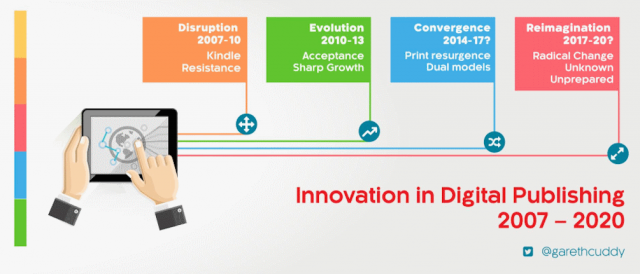The disruptive innovation of ebooks and readers has become so self-evident that even industry experts tend to forget that digital book business is still taking its first baby steps. It is a long way to go (years, tens of years) for ebooks before the dust settles. That’s why I was glad to read an excellent article by Gareth Cuddy (the founder and CEO of Vearsa) where he analyzes the state of the ebook industry and where it is heading.
Professor Clayton Christensen coined the term disruptive innovation in his book The Innovator’s Dilemma . The key concept is the way new technologies disrupt established markets by introducing simple applications at the bottom of a market and then relentlessly moving up market, eventually displacing established competitors. Examples are personals computers that displaced mini computers with terminals, and mobile phones that displaced traditional telephones.
Ebooks and digital media in general (music, movies, tv, newspapers, magazines) are not only technically capable of displacing their analogue counterparts, but also the time is ripe for radical renewal of the book industry as well as other media industries.
Gareth Cuddy uses Steven Sinofsky’s application of Christensen’s disruptive innovation as a framework for analyzing the development of digital publishing. Sinofsky’s four stages of disruption are:
Gareth Cuddy determines that digital publishing is in convergence phase (phase 3). He argues that the plateauing of ebook sales, the resurgence of print titles in 2014, and the talk of ebooks going “out of fashion” prove that convergence of the old industry and new technology has started. He also points out that print vs. digital is also not a battle to the death.
Here is where I disagree. I see digital books still firmly in evolution phase ( phase 2).
Ever since the Kindle and EPUB formats were introduced and the first ereaders became available, nothing has changed in digital technology. We still don’t have interactive, multimedia EPUB3 or KF8 books, we still don’t have color screens in our ereaders. We have, however, some development: book lovers and young generations who have adopted tablets and smartphones as their reading devices.
Sure, ebook sales has developed favorably in the U.S. and UK, but elsewhere ebook sales are still minimal. Ebook evolution is only taking its very first baby steps. In most markets outside English markets, books are being converted to ebooks, digital sales channels are being set up, and because the traditional book business isn’t used to moving fast, all this takes time. Even tax laws in the EU have to be changed so that ebooks and paper books are treated equally.
I expect the evolution phase of ebooks to continue until 2020. A massive development and massive business opportunity for the book business is the school and academic market, as well as non-fiction market. These markets will need more advanced technical solutions and licensing models than the industry can offer today.
Phase 3 (convergence) will be about digital publishing and self-publishing that will find new ways to work with established businesses. New business models will emerge. Convergence will be about new retail models, like subscription services that already have begun to develop. Convergence will also mean that multimedia and interactivity will be introduced to books in a meaningful way.
So, I expect phase 4 (re-imagination) to start in 2025 at earliest. After a fast start, ebook publishing will take its time before it finds the future of books. New business models, new book concepts will be created, but before majority of customers – people who read books – are convinced that new is better than old, the industry has to keep innovating.

